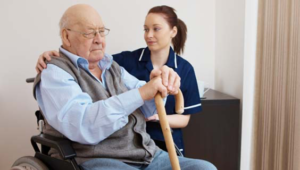Dementia currently affects 50 million people worldwide. The hallmark symptom of dementia is memory loss. But did you realize that up to three quarters of dementia sufferers have behavioral issues as well? Typically the behavioral issues include agitation, aggression and anxiety. As dementia worsens, those traits worsen as well. In fact, agitation and aggression often become the most challenging aspect of care giving, eclipsing the effects of memory loss itself.
Behavioral issues pose severe implications on patients and care-givers. Commonly the response to this vexing problem involves prescribing medications. Powerful psychotropic medications are the first line therapy. These medications generally fall into two categories: Antipsychotics, which are medications approved for treatment of schizophrenic patients, are given for anxiety, restlessness and disruptive behavior. And antidepressants are given for low mood and anxiety. I hesitate to include the third category of extremely problematic ones called anxiolytics, lorazepam and oxazepam, both are like diazepam (Valium). These medications are used to reduce undesirable behavior, but come with a host of side effects for the individual. I won’t go into all of them. But suffice to say that the side effects are numerous and extreme examples include greater risk of stroke and death in older individuals with dementia. This fact prompted the FDA to order manufacturers label such drugs with a “black box” warning about their risks along with a reminder that they are not approved to treat dementia symptoms. Surely there must be a better approach, right?
Now, promising new research published October 14, 2019 in Annals of Internal Medicine shows us there is a better way. Interventions such as outdoor activities, massage and touch therapy not only are more effective than medications alone, but may be better in come cases. This seems pretty simple. And now, due to this work, there’s proof it’s effective, too. Dr. Jennifer Watt of the Li Ka Shing Knowledge Institute at St. Michael’s Hospital-Unity Health in Toronto, shares her synopsis:
“The bottom line from our study is that non-medication based therapy and multidimensional care seem to be better than medications for treating the symptoms of aggression and agitation in persons with dementia.”
The interventions studied were multi-dementional and multi-disciplinary, spanning a spectrum from modifications in activities of daily living (ADLs) to music therapy, massage and touch therapy, recreation therapy, aroma therapy, animal therapy, pain management, and various support and education to caregivers.
Another important point the researchers made was there is no one-size-fits-all approach. They recommend that treatments should be tailored to the patient and their specific experiences. I found this a very insightful and thoughtful recommendation. Tailoring specific therapies is at the heart of what we do in Functional Medicine. So this is refreshing to hear. The researchers did point out some specific take-aways, however. When it comes to physical aggression and agitation, outdoor activities were more effective. Exercise combined with ADL modification also ranked highly for physical aggression. And with verbal aggression, massage and touch seem to work better. While the study looked at individuals in assisted living or nursing facilities, the findings may be just as helpful for those being cared for at home by a loved one.
If you are a provider, consider other modalities before reaching for the proverbial pen and prescription pad. If you are a care-giver of a dementia sufferer, then consider these non-pharmacologic interventions first. Ask yourself, what was this individual accustomed to having in their former life? Did they enjoy music? Were they always physically active? Were they a care-giver themselves? When you find those answers then thoughtfully construct ways to build those activities back into their daily lives in a meaningful way. Work to find ways to remind them of their identify and reorient them to person, place, time and setting. Give them a routine. Incorporate physical movement, outdoor exposure, physical contact. Enlighten all of their senses! We can do so much more with these simple modalities, stop reacting instinctively to medicate, and consider the alternatives — which, are more effective, This study proves it!
Do you agree, or have additional thoughts, if so leave them in the comments section below. Let’s get a discussion going!
SOURCE: bit.ly/2IQ5wT8 Annals of Internal Medicine, online October 14, 2019.


